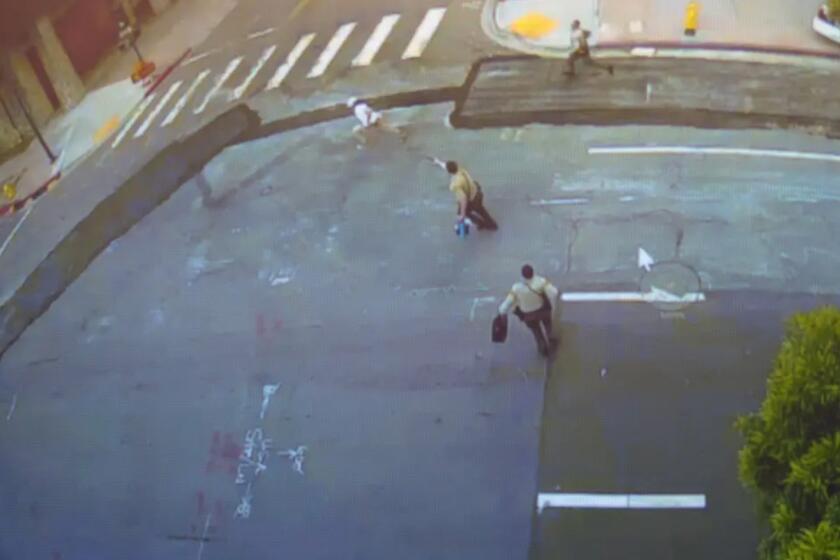Deputy’s Slaying by Colleague Ruled Legal
Moments after firing three rounds at a masked intruder at an Encinitas home last year, Sheriff’s Deputy Gary Steadman heard three words that he would never forget: “Gary, it’s me.”
Steadman had responded to a report of a residential burglary and stepped through an unlocked door. He saw a man wearing a nylon stocking mask beating someone whose head was covered with a pillowcase, his hands and feet bound. The masked man held a can of lighter fluid.
Steadman yelled, “Freeze!” but the intruder appeared to be reaching for a knife on a butcher block. Steadman fired at his leg but wasn’t sure he connected. The man was still moving toward him. He fired twice more before the man fell and spoke Steadman’s name as he lay on the floor.
For a second, Steadman wondered how the robber could possibly know him. Then Michael Stanewich, a colleague from the Encinitas patrol station and casual friend, stripped off his mask. Steadman couldn’t believe it.
“Stanewich told Steadman that he was hurt, that he was hurt badly,” said Lt. John Tenwolde, who investigated the shooting. “Gary attempted to reassure Stanewich that he would do everything he could to help him out.”
Stanewich died at the scene July 3, exposing the darkest episode in the history of the San Diego County Sheriff’s Department. When Sheriff Jim Roache arrived at the scene and was told of the incident, he cried out in frustration.
After nearly a year of investigation by sheriff’s and district attorney’s investigators, Stanewich’s shooting was ruled legally justified. Both agencies also concluded that no other deputy was involved in the attempted robbery, as one of the victims had asserted. In all likelihood, Roache said, an undocumented immigrant probably happened by.
“This was a tragic, unfortunate incident in our organization’s history,” Roache said Friday at a news conference. “But I think the community and we ourselves recognize this for what it is. An aberration.”
Stanewich, a 9 1/2-year veteran of the department, had joined four other deputies and a sergeant for a search of Donald Van Ort’s home on May 30, 1991, based on an informant’s tip that Van Ort, a 33-year-old travel agent, had drugs in his home.
The deputies did not need a search warrant because Van Ort had waived his search and seizure protection after receiving a suspended prison sentence and five years’ probation in an assault case.
The search turned up no drugs, but detectives discovered between $100,000 and $150,000 in cash in a pillowcase inside a locked safe. Helen Van Ort, Donald’s 82-year-old grandmother, said the money came from the sale of her farm.
The day after the search, Stanewich appeared at the Van Ort home and told Van Ort he had not been complying with routine urine tests that were part of his probation terms. Van Ort said that, after Stanewich left, he noticed that a rear door screen was partly open.
Stanewich visited a deputy district attorney in Vista the same day and told him he believed Van Ort was involved in illegal drug activity. He also phoned an informant who said Stanewich sounded dejected because no drugs were found but was convinced the large amount of money must have come from a drug sale.
During classes taught by the Drug Enforcement Administration in June, 1991, Stanewich told a fellow classmate that he wanted to open a retail uniform shop, had found a location in Mira Mesa, had secured $90,000 in loans, and needed only $30,000 more.
The day of the robbery, July 3, Stanewich dropped a colleague and his family off at Lindbergh Field and drove to Olivenhain, a suburb of Encinitas. He got out of his car and removed his license plates.
Van Ort’s doorbell rang between 9 a.m. and 10 a.m. Having just taken a shower, Van Ort walked to the front door in a bathrobe. When he opened the door, Stanewich was outside, pointing a gun and wearing a stocking on top of his head, sunglasses and rubber surgical gloves.
As soon as he rushed into the house, Stanewich pulled the mask over his face, said Van Ort, who noticed a second person behind Stanewich. The second man looked like one of the other deputies who was part of the May 30 search, Van Ort said, and left the scene immediately without coming into the house.
Stanewich backed Van Ort into the kitchen, forced him to the floor, handcuffed and hogtied him. He also pushed Helen Van Ort to the floor. Donald Van Ort accused him of working with Julie Malone, Van Ort’s former girlfriend whom he assaulted in September, 1989.
“You know, Jules sent me here . . . she wants . . . all I want is two rings,” Stanewich reportedly said. “Give me the combination to your safe. . . . I want those rings. . . . Julie wants me to get those rings for her.”
Placing a pillowcase over Van Ort’s head and dousing it with lighter fluid, Stanewich “started slugging” him in the face and threatened to light a match unless Van Ort gave him the safe combination.
Sheriff’s investigators released details Friday of a conversation between Stanewich and an informant June 19, 1991, when Stanewich went to his home and asked him to help rob a home in Olivenhain.
“What I need to do is, there’s a dealer in Encinitas that lives in Olivenhain. . . . what I need to do is to get his attention, go into this house and contain him,” the informant said Stanewich told him.
“Doesn’t matter what it takes,” he said. “Don’t kill the guy or nothing, you know, you can beat him up or whatever, just make sure he’s alive when I get there.”
The informant told investigators that Stanewich wanted him to take along two others to help with the robbery, one to help control Helen Van Ort. Stanewich said he would be wearing a ski mask, take lighter fluid and that he wanted papers from inside the safe.
“Mike said if he wasn’t gonna give us the numbers, he was gonna spray his pants on fire,” the informant said. “He was gonna bring a police hand-held radio talkie . . . to know if any of the neighbors called . . . the police.”
Stanewich told the informant not to use handcuffs on Van Ort so it would not look as if a police officer was involved in the crime. The informant said he offered to do the job free, but Stanewich offered him $5,000 and $2,000 more for the other two accomplices. The informant never heard from Stanewich again and was not involved in the job.
On the day of the robbery, Steadman got a radio call about a residential robbery. He joined another deputy at the scene and slowly entered the kitchen, where he saw the masked Stanewich.
“Freeze. Sheriff!” he yelled, pointing his pistol at Stanewich. Steadman said he saw a “butcher-block-type knife” near Stanewich. As Stanewich got closer to the knife, Steadman fired one round.
“I did not know (at) what point he would do something further to (Van Ort),” Steadman said in an interview. “I determined at that point in time that (he) was a great risk to myself (and) two other people. I didn’t want to kill him. I just wanted to cease his movements towards me or cease his danger to the other people that were there in the house.”
Steadman said he ordered Stanewich to freeze a second and third time.
“He started to come at me what seemed to be a little bit faster,” Steadman said. “He was flailing around his hand (and it was) coming towards where that knife was, and that’s why I fired two more rounds.”
An autopsy report showed two bullet wounds in Stanewich’s back. Steadman said Stanewich was constantly twisting and moving as he fired from 6 feet way.
“I can’t explain why he was shot in the back,” Steadman said in the report released Friday. “I thought I shot him in the stomach.”
The district attorney’s office concluded that Stanewich probably turned toward the front door after the first gunshot.
Stanewich, the district attorney ruled, “embarked on a private enterprise” to rob the Van Orts after he saw the money May 30.
“His conduct during this incident was as bizarre as it was reprehensible,” the district attorney’s report says. “It is almost incomprehensible that a career peace officer would concoct such a plan, much less attempt to openly engage criminals to assist in carrying it out. We are unable to explain it.”
Neither Van Ort nor his attorney, Dwight Ritter, could be reached for comment. Van Ort and his grandmother filed a federal lawsuit last month against the Sheriff’s Department, saying their civil rights had been violated.
More to Read
Start your day right
Sign up for Essential California for news, features and recommendations from the L.A. Times and beyond in your inbox six days a week.
You may occasionally receive promotional content from the Los Angeles Times.






